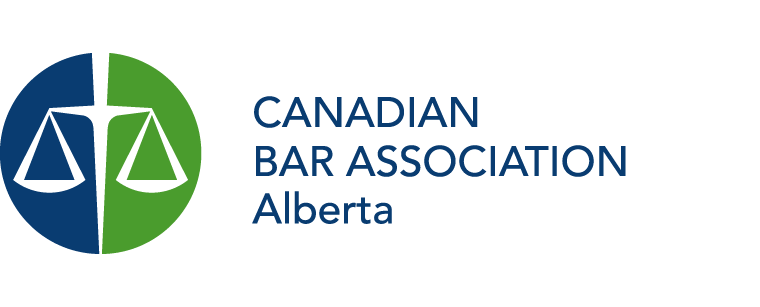To: Hon. Minister Dan Williams (Minister of Mental Health and Addiction)
The Canadian Bar Association, Alberta Branch (“CBA-Alberta”) is an organization representing nearly 5,500 lawyers in Alberta. In addition to the work done by our Legislative and Law Reform Committee to review legislation to ensure robust drafting, CBA Alberta also provides insight when government is proposing significant changes to existing systems, and it is in that capacity that we write.
Bill 53, the Compassionate Intervention Act (CIA) was recently introduced in the Legislature, which permits the involuntary commitment of vulnerable Albertans to drug treatment facilities. This legislation will have a significant impact on those Albertans most at risk.
CBA Alberta, while appreciative of the reasons supporting this development, has identified a few areas that warrant additional consideration.
The first area pertains to the management of resources to support this direction. There are already many at risk Albertans who are willingly seeking drug treatment programs and are left unserved. There is a positive correlation between Albertans involved with the criminal justice system and their dependency on drugs. Quite often, the arrest of the individual puts them into a moment of crisis and serves as motivation to change their behaviour. It is hard enough helping those who want help. The proposed regime of involuntary commitment of Albertans to drug treatment facilities will result in further strain on an already over-taxed system.
Secondly, CBA Alberta is concerned about the CIA’s overly broad language for several reasons including:
- The breadth of “family member” has great potential for abuse. While well-intended, the current language would allow for vindictive or disgruntled family members (such as those involved in the estate or family litigation) to use the CIA in vengeful and nefarious ways.
- Equally concerning is the use of the term “substance use or addiction”. Is the legislation intending to capture alcohol use disorder? What about other forms of addiction, such as gambling or pornographic? If the CIA is intending to target illegal drug use, then the language used needs to be narrowed and tightened.
- There are some mandatory provisions, such as the issuance of apprehension orders that give no discretion. This does not allow for the consideration of circumstances where issuing those orders may be problematic or even counterproductive.
CBA Alberta supports legislation that is Charter compliant and the case of JH v Alberta (Minister of Justice and Solicitor General), 2020 ABCA 317 is assistive in this regard. As currently drafted, there are several sections of the CIA which are likely to invite Charter challenges, including:
- Prohibition by the “client” from exercising cross-examination of a “family member” who submits a family impact statement or makes representations which is likely a section 7 Charter violation for failing to allow the client to defend oneself on matters of credibility.
- Collection of profoundly private records without prior judicial authorization.
- Various provisions that do not give the client the ability to refuse the administration of drugs authorized by a treatment order or care plan, and permitted in accordance with an identified schedule of drugs which includes public health drugs including vaccinations.
- It is uncertain whether the many references to the “client” having access to legal advice and to be represented by a lawyer confirms that this legal advice and representation will be available free of charge or through Legal Aid of Alberta. In any event, being able to make full representation appears to be hindered.
Next, there is concern that the CIA does not address how it is to work together with existing legislation, such as the Personal Directives Act, the Adult Guardianship and Trusteeship Act (AGTA) as well as the Youth Criminal Justice Act (YCJA). These acts allow an authorized person, either appointed by the client or Court, to make health care decisions on an individual's behalf. Section 17 of Bill 53 does not provide an Agent or Guardian with the ability to request an assessment order (or respond to any such application made on behalf of that “client”), and such appointed persons would be required to apply for standing (notwithstanding their presumed authority either under a Personal Direction or Guardianship Order). Even if permitted to make an application on behalf of a “client”, as drafted, Bill 53 permits any “family member” to apply to override the decision of an existing decision-maker of a minor or adult guardian.
By way of example, I would draw your attention to when guardians of minors are involved. The YCJA has a more robust parent/guardian notification scheme (which also contains a provision that indicates the appointment of independent counsel for the minor and parent, where they interests diverge). The aforementioned acts have established processes and procedures that deal with the issues raised in the CIA, including capacity, addressing the potential of self-harm and harm to others, and the involvement of guardians. Why have overlapping or parallel processes when well-established legislation exists? A substantive comparative evaluation of existing legislation is warranted.
The legislation is evidently designed for expediency; however, CBA Alberta is concerned it is done at the expense of procedural fairness. A few examples:
- That the CIA does not identify how long the review application process will take, but only that apprehension orders will be issued within 72 hours. An initial question is the reasons supporting 72 hours when the Mental Health Act provides for a 24 hours requirement. What resources are being allocated to ensure that the timeline of 72 hours can be met? Once this legislation is proclaimed in force and considering peace officers now have been given powers pursuant to the CIA, there is a real possibility that the mandatory 72 hours cannot be met as the queue could significantly increase in length. This goes back to the first issue raised in this letter, that of resource management. As an aside, the legislation appears to lack clarity on the process of getting an apprehension order.
- That it is unclear when the “client'” will be able to participate in the process and additionally whether there is any presumption with respect to the “client’s'' capacity (and if it is presumed the “client” does not have capacity, the threshold requirements for establishing this). Notably, under the AGTA, there is a provision which allows for an urgent Guardianship Order to be granted in the event the adult lacks capacity to make a decision about a personal matter and there is immediate danger of death, serious physical/mental harm, and the Office of the Public Guardian must be served with a copy of the application. There does not appear to be any such parallel service / notice requirement for applications for assessment / apprehension under Bill C 53.
Furthermore, if understood, the applications for apprehension and assessment are paper applications done on an ex parte basis, or without notice such that the “client” is not afforded the right of representation or provided with the decision. - That the hearing may also be subject to two separate 7-day adjournments. In other words, between the time of apprehension and hearing, someone could be detained for 17 days before they (or their representative) are allowed to make substantive submissions before a decision-maker (though they could make submissions on the adjournment applications). These adjournment periods increase the risk that clients could lose their employment, miss civil or family court dates or other important events like signing leases if parties with no knowledge of those (such as police) or opposing parties force them through the CIA process. These parties would also face no consequences.
- That the rules of evidence are not applicable. This significantly increases the risk of abuse and acting in bad faith.
The CIA grants peace officers the ability to make application and apply for apprehension orders which is an expansion over the Mental Health Act. While appreciating the purpose of the CIA and the prima facie reasonableness of appointing peace officers, the concern lies with the fact that these officers have limited interactions with the “clients” which does provide for an accurate representation of the “client’s” overall circumstances which need to be considered to warrant intervention.
The establishment of the “Commission” is also challenging based firstly on its composition. As drafted, the “lawyers members” are significantly empowered without oversight and much of their authority will be based on the regulations which leaves much yet to be defined. The next concern lies with how the Commission exercises its decision-making powers. The CIA lacks clearly defined checks and balances to ensure that all decisions made by the Commission are transparent and accountable.
CBA Alberta understands the purpose of the CIA, however, CBA Alberta is concerned the legislation, in its current form, is overly broad, vague, and leaves the door open for a significant amount of abuse. CBA Alberta remains ready to participate and support the development of legislation that protects the most vulnerable Albertans. Please contact us if you need clarification on any of the above or if we can be of further help to you in achieving an improved system.
Yours truly,
CANADIAN BAR ASSOCIATION
ALBERTA BRANCH
Robert D.L. Bassett, President










